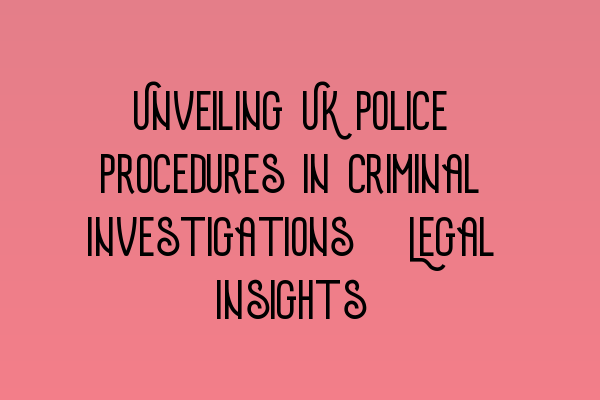Unveiling UK Police Procedures in Criminal Investigations: Legal Insights
The criminal justice system in the United Kingdom operates under a set of well-defined procedures that ensure fairness, justice, and the protection of individuals’ rights. In this article, we will delve into the various police procedures involved in criminal investigations and shed light on the legal insights surrounding them.
Arrest and Detention
When a crime is reported or suspected, the police have the power to arrest and detain individuals for questioning. This process must adhere to certain legal requirements, such as reasonable grounds for suspicion and the necessity of arrest. Understanding these procedures is essential for both the police and individuals involved.
To better comprehend the arrest and detention process, it is crucial to have knowledge of the Police and Criminal Evidence Act 1984 (PACE), which sets out the powers and limitations of the police in conducting their investigations. By being aware of your rights and responsibilities, you can ensure a fair and proper investigation.
Search and Seizure
During a criminal investigation, the police may carry out searches and seizures to gather evidence. It is important to understand the legal framework surrounding these procedures to safeguard against any improper or illegal conduct by the police.
The law provides safeguards against unreasonable or invasive searches, ensuring that individuals’ rights to privacy and personal property are respected. Familiarizing yourself with the principles laid out in the PACE Code of Practice A can help you understand the scope and limitations of police search and seizure powers.
Interviewing and Questioning
Once an individual is arrested, the police have the right to conduct interviews and question the individual regarding the alleged crime. It is essential for both the police and the individual being questioned to understand their legal rights and obligations during this process.
The right to legal representation, the right to silence, and the cautionary words are all crucial components of the police questioning process. Being aware of these rights can help you navigate the interview process effectively and protect your interests.
Charging and Bail
After completing their investigation, the police may decide to charge an individual with a criminal offense. At this stage, it is essential for the arrested person to understand the charging process and their rights, including the right to apply for bail.
Understanding the criteria for granting or refusing bail can significantly impact an individual’s ability to secure their release pending trial. Familiarizing yourself with the Bail Act 1976 and related legal principles can help you make informed decisions and protect your rights.
Conclusion
Unveiling the UK police procedures in criminal investigations provides valuable insights into the legal framework surrounding arrests, searches, interviews, and charges. By familiarizing yourself with these procedures and your rights, you can navigate the criminal justice system more effectively and ensure fair treatment.
If you are preparing for the SQE (Solicitors Qualifying Examination) and looking for practice exam questions and preparation courses, we recommend checking out the following related articles:
- SQE 1 Practice Exam Questions
- SQE 1 Practice Mocks FLK1 FLK2
- SQE 2 Preparation Courses
- SQE 1 Preparation Courses
- SRA SQE Exam Dates
